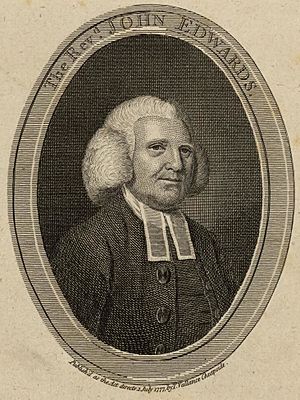John Edwards (minister) facts for kids
John Edwards (born 1714, died 1785) was a British minister who lived a long time ago. He was known as a "dissenting minister" because he didn't follow the main Church of England. Instead, he was a Methodist preacher in a town called Leeds in Yorkshire.
Contents
A New Kind of Church
John Edwards started as a Methodist preacher. Methodists were a new Christian group at the time. However, Edwards decided to go his own way. He broke away from the main group of Methodists, who were led by the Wesleyans.
In 1755, John Edwards started his very own church. It was an "Independent church," meaning it was separate from other groups. This church was located at a place called the White Chapel in Hunslet Lane, Leeds.
What He Wrote
John Edwards was also a writer. He published several books and collections of songs.
A Vindication of the Protestant Doctrine of Justification
In 1758, Edwards published a book with a very long title. It was called A Vindication of the Protestant Doctrine of Justification and its Preachers and Professors from the unjust Charge of Antinomianism. This book was based on a letter from another minister named Robert Trail. Edwards wrote it to explain his beliefs. He wanted to show the world the ideas he taught in his sermons.
The Safe Retreat from Impending Judgments
Later, in 1762, he published another work. This one was called The Safe Retreat from Impending Judgments. It was based on a sermon he gave in Leeds. A sermon is a speech given by a minister. This book was popular enough to have a second edition in 1773.
The Christian Indeed and Hymns
Edwards also wrote a book called 'The Christian Indeed'. It was advertised at the end of his sermon book. Besides his own writings, he helped put together a songbook. This book was titled A Collection of Hymns and Spiritual Songs. It was made for Christians of all different groups. A second version of this songbook came out in 1709, with some changes.
His Legacy
John Edwards passed away in 1785. A special kind of picture of him was made in 1772. It was a mezzotint portrait, which is a type of print. This picture was based on a painting by John Russell and was engraved by James Watson.
 | May Edward Chinn |
 | Rebecca Cole |
 | Alexa Canady |
 | Dorothy Lavinia Brown |


